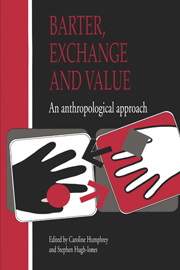Book contents
- Frontmatter
- Contents
- List of figures
- List of contributors
- 1 Introduction: Barter, exchange and value
- 2 Politicised values: the cultural dynamics of peripheral exchange
- 3 Yesterday's luxuries, tomorrow's necessities: business and barter in northwest Amazonia
- 4 Some notes on the economics of barter, money and credit
- 5 Fair dealing, just rewards: the ethics of barter in North-East Nepal
- 6 Inter-tribal commodity barter and reproductive gift-exchange in old Melanesia
- 7 Qualified value: the perspective of gift exchange
- Index
5 - Fair dealing, just rewards: the ethics of barter in North-East Nepal
Published online by Cambridge University Press: 05 June 2012
- Frontmatter
- Contents
- List of figures
- List of contributors
- 1 Introduction: Barter, exchange and value
- 2 Politicised values: the cultural dynamics of peripheral exchange
- 3 Yesterday's luxuries, tomorrow's necessities: business and barter in northwest Amazonia
- 4 Some notes on the economics of barter, money and credit
- 5 Fair dealing, just rewards: the ethics of barter in North-East Nepal
- 6 Inter-tribal commodity barter and reproductive gift-exchange in old Melanesia
- 7 Qualified value: the perspective of gift exchange
- Index
Summary
This paper discusses some implications of barter for morality and ethnicity. In the Arun Valley of North-East Nepal barter is not a haphazard expedient, but is the major type of economic transaction both between and within ethnic groups. This paper shows what kind of social relations are created by barter when it is a constant feature of the regional economy. In barter, unlike many gift-exchange systems, people transact different items (they acquire what they have not got and vice versa) and thus barter tends to link micro-economies which, at least in this respect, are dissimilar from one another. Towards the end of the paper it is suggested that the shifting ethnic identities for which highland Nepal is so well known can be seen as consequent on the dependencies and enmities created by barter. Here, the more marked ethnic distinctions need not imply hostility. People define themselves as different from those with whom they exchange products in long-term relations, but they are also dependent on, and need to maintain trust with such groups. On the other hand, they are in frequently hostile competition with the groups which have a similar economic niche and economic values to themselves. To demonstrate these points the paper will focus on the Lhomi, a group of farmers and traders, in their situation in the vertical Himalayan economy.
- Type
- Chapter
- Information
- Barter, Exchange and ValueAn Anthropological Approach, pp. 107 - 141Publisher: Cambridge University PressPrint publication year: 1992
- 7
- Cited by



